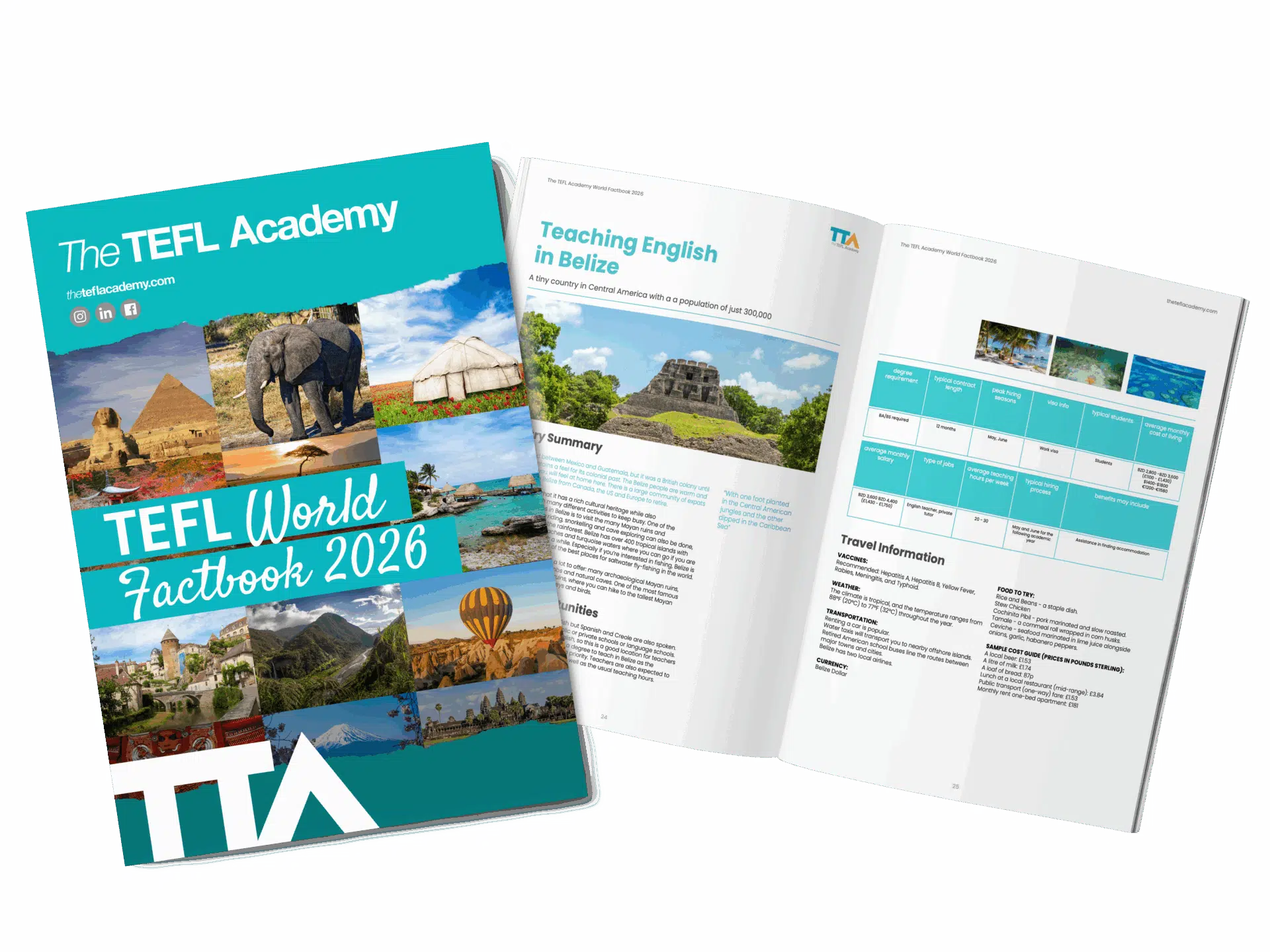Teach English in Italy
a world of opportunities
Join a global community of over 200,000 TEFL teachers working throughout the world! Enrol me!
Contents
Introduction
Why teach in Italy
Best places to teach
Visa requirements
Teaching experience
TEFL certification
Degree requirements
Non-native speakers
Startup capital
Types of jobs
Other programs
How to get a job
Average salary
Common benefits
Cost of living
Saving in Italy
Life and culture
Are you looking for a place where every nook and cranny is full of history, art and beautiful architecture? Is your heart aching to be surrounded by majestic mountains, picturesque lakes, sunny coastlines and stretches of dark green woods? Or do you just want to eat amazing food all the time? Then Italy is the teaching destination for you!
Italy has so much to offer teachers! The demand for English teachers is on the rise in the country. So not only can you make a good living in Italy but you can also enjoy amazing food, culture and art. You will find your happy place in Italy!
Why teach English in Italy?
You mean, besides the pizza?! Italy has a lot of teaching opportunities for teachers and is a wonderful place to start your TEFL teaching journey. Teaching English in Italy you can enjoy:
A good work life balance: Teaching work weeks in Italy are usually capped at 25 hours per week, so you can enjoy your afternoon cappuccino at leisure.
Travel opportunities: Italy is one of the most beautiful countries in the world. You will be spoilt for choice when it comes to travelling. From amazing cities like Milan, Naples, Pisa, Pompeii, Venice, Florence and Rome, to the beautiful Amalfi coast, the Cinque Terre and Sicily, the country is full of beautiful landscapes and amazing places to visit.
The food: Italian cuisine is more than just pizza and pasta. Each region in Italy has their own speciality when it comes to food. Don’t forget to try Italian gelato and don’t miss out on the Italian coffee culture.
Best places to teach English in Italy
English teachers are in high demand all over Italy. You can find a job in a major city or a smaller town. As with most TEFL jobs the best paying positions are situated in big cities like Rome, Milan and Naples.
Rome
For the romantic
Rome is the capital of Italy and home to some of the most historic monuments, art, and architecture in the world. Some of the best-preserved Roman monuments are all within walking distance from each other in Rome. Rome has a wonderful cafe-culture and you will find a cafe around every corner. Here you will be surrounded by galleries, statues, and cultural sites; and never be bored.
In Rome you will find teaching opportunities in language schools, international schools, and businesses offering English courses for professionals.
Milan
For the trendsetters
Milan is often referred to as the fashion capital of Italy. It’s a bustling city with a diverse, multi-cultural population. A lot of Italy’s big universities are located in Milan. Milan has a lot of art and beautiful architectural sights to offer.
Teachers might enjoy Milan more because it has fewer tourists than Rome, but housing costs are much higher in Milan than in other cities in Italy.
Milan has a steady demand for English teachers, especially for Business English teachers. You will also be able to find positions at language schools and international schools in the city.
Other popular places
Florence is another city you can look at to teach English. Florence is the capital of Tuscany, a region famous for its amazing landscapes. If you’rre looking for a city that feels smaller than Rome or Milan, then Florence is the place for you. In Florence you will most likely find a job at a language school but private tutoring is also very popular.
Other popular cities are Bologna, Verona, Naples and Turin. Though there are teaching opportunities all over Italy, in general, the bigger the city, the more teaching jobs there’ll be.
Do you need a visa for teaching English in Italy?
If you are a EU citizen then you do not need a visa to teach in Italy. Non-EU citizens need a visa to teach in Italy. The visa process for non-EU teachers is quite lengthy and complicated, but it’s not impossible.
Some teachers (mostly from the USA) get employed in Italy on a student visa. To be employed on a student visa, you have to be enrolled for a study course in Italy. This visa allows you to work a certain number of hours a month while you are studying.
Do I need teaching experience to teach in Italy?
Prior teaching experience is needed if you are looking for a TEFL teaching job at a formal setting in Italy – at a university, public school or international school. Summer camps are really popular in Italy and a great way for new teachers to start their careers as most summer camps hire teachers without teaching experience.
Which TEFL certificate do I need to teach in Italy?
Most public and private schools in Italy require you to have a TEFL certificate to teach English in Italy. If you are serious about teaching English in Italy then the best thing you can do is get yourself TEFL-qualified with a TEFL certificate that has a minimum of 120 hours.
The TEFL Academy is the perfect place to get qualified and the first step to finding that perfect job in Italy. Getting your TEFL certification through The TEFL Academy gives you the edge when applying to teach at language schools, universities, summer camps and even private tutoring positions.
Can I teach English in Italy with no degree?
A Bachelor’s degree is typically required for teaching English in Italy. However, your degree does not have to be in teaching.
It is possible to find a job teaching in Italy without a degree, but this is likely to be a volunteer, summer camp, or other entry-level position.
Or, you can become a digital nomad! If you cannot get a work visa for Italy, you can try for an Italy Freelancer Visa. You can apply for this visa if you work as a freelancer or self-employed.
For all our non-EU friends, there will soon be more options for you! Though there is no digital nomad visa yet in Italy, it has been signed into law and looks set to be implemented soon.
Can non-native speakers teach English in Italy?
Yes you can, but you will be expected to be fluent in English (to speak at a native level). Teachers from the USA, Canada, the UK, Ireland, Australia, New Zealand and South Africa are preferred.
How much start-up capital do I need?
Start-up costs are the basic costs you will need to survive from when you arrive in Italy until you receive your first paycheque. We suggest you have about € 1,600 ($1,800 USD) available to start off in Italy before you receive your first paycheque.
Here are a few costs you need to consider when starting out in Italy:
- Accommodation: First month’s rent and security deposit.
- TEFL certification: A TEFL course can cost between $100 and $500, depending on the length and level of the course and the course provider.
- Document fees: Any costs related to certifying and notarising your degree and TEFL certificate.
- Flight ticket: Variable.
- Visa application: The cost of a visa is subject to your home country. You can expect to pay between $100 and $150.
- Living expenses: You will need one month’s worth of start-up capital of about €750 – €1,000 ($815 – $1,100).
Types of teaching jobs in Italy
Private language schools
Teaching at a private language school is the most popular option for TEFL teachers in Italy. Lots of Italian students take classes at private language schools to improve their English.
Many language schools focus on Business English for professionals. Classes are mostly held in the evenings and over weekends. Contracts are usually for 9 -10 months, which leaves the summer open for teachers to get an additional job at a summer camp. Private language schools are open to hire non-native speakers.
Public schools
In Italy teachers who want to work at a Public school have to be fluent in Italian. Most of the positions at public schools are given to EU citizens, but there are specific programs that focus on placing teachers in public schools.
One of these programmes is the British Council’s Teach English as a Language Assistant in Italy programme. This programme might be worth your while, but make sure that you research the strict requirements of the programme.
Private lessons
Private tutoring is a great way for teachers to supplement their income in Italy. TEFL teachers in Italy charge about €24 ($27) an hour for a one-on-one session. Finding students for your private lessons is usually easy as a lot of Italians want to improve their English.
Online
Online teaching is a great way to set your own schedule and be your own boss. The online teaching market is growing each day and there are loads of opportunities for online teachers. Many teachers are familiar with teaching online to students in Asian countries like China and Japan, but more and more European students are wanting to improve their English. And they are looking towards the online world to do so.
Here are some general requirements for teachers who want to teach online::
- Native English speakers from the United States, Canada, UK, Ireland, South Africa, Australia, and New Zealand are preferred.
- Teaching experience of some kind might be required.
- A TEFL qualification is a must. The TEFL Academy offers a Level 3 120-hour Online TEFL Course, a Level 5 168-hour Online TEFL Course and a Level 5 168-hour Combined TEFL Course. Any of these options will stand you in good stead in the online world of teaching.
Besides these basic requirements, teachers wanting to teach online are expected to have the following:
- 10+ Mbps download and upload speed
- A good-quality headset and microphone
- A decent laptop or desktop and webcam
Other teaching programs in Italy
Summer camps
Summer camps are extremely popular in Italy. These camps are attended by young and older Italian children. They fall outside the school year and run for two or three months. This allows teachers who have the summer off to teach at summer camps. Summer camps are situated all over Italy.
They usually provide teachers with accommodation, travel to and from the camp and daily meals. Summer camps pay per week, and teachers can expect to receive about €245 ($270) a week. Most summer camps require a TEFL certificate and/or a Bachelor’s degree, but they are lenient on teaching experience.
International schools
International schools are mostly located in Rome or Milan. They provide expat children with schooling according to a British, American or International Baccalaureate (IB) curriculum. International schools hire teachers with advanced teaching experience, a Bachelor’s degree and TEFL certification.
International schools offer very competitive salaries and great benefits. Teachers at international schools are also needed to teach subjects like Maths and Biology.
How to get a job teaching English in Italy
Italy has a demand for English teachers, but it will be more difficult for non-EU citizens to find jobs due to difficult visa procedures. Here are some tips to help you make your dream of becoming a teacher in Italy true:
- Apply directly to the school. Find out who the decision maker is at the school and email them directly.
- Make sure to include all the relevant information to your email. This includes a complete resume, a good photo of yourself, a copy of the first page of your passport, TEFL certificate, and Bachelor’s degree.
- Learn some basic phrases in Italian – this will go a long way in impressing your potential employer.
- Schools in Italy like a personal approach. If you can visit the school it will be a good idea. This will show them that you are eager, that you are already in the country and that you are work ready.
What is the average teaching English salary in Italy?
The average salary of a TEFL teacher in Italy ranges between €1,800 – €2,300 ($2,000 – $2,600) a month.
Placement programmes usually offer €1,000 – €1,800 ($1,200 – €2,000).
Private language schools pay €16 – €32 ($18 – $36) an hour.
In public schools, teachers can earn €1,200 – €2,400 ($1,400 – $1,800).
For private lessons, TEFL teachers usually charge €22 – €35 ($24 – $48) an hour.
What are the common benefits for teachers in Italy?
The salaries in Italy might not be as high as in other European countries, but teachers can look forward to a lot of benefits that will bring their cost of living down. Teachers in Italy can expect:
- 20 paid vacation days per year
- Health insurance
- Flights
- Accommodation or housing allowance
- Annual bonuses
- Italian classes
What is the cost of living in Italy?
Living and working in Italy is a dream of many teachers. The reality is that the dream is more attainable than you think. Italy is one of the most affordable Western European countries and the cost of living is much lower compared to countries like France and Germany. In Italy a teacher can have a very comfortable life, while travelling and living their best lives.
Here are some of the usual costs for living in Italy – but bear in mind, these vary quite a lot depending which region or city you are in:
Accommodation
- A one-bedroom apartment in the city centre: €1,000 ($1,100) a month
- A one-bedroom apartment outside the city centre: €500 ($545) a month
Utilities
- Electricity, water, and gas: €180 ($200) a month
Food and groceries
- Monthly shop: €225 ($250)
- Meal at an inexpensive restaurant: €15 ($16)
Transport
- Monthly travel pass: €35 ($38)
- One-way ticket: €1.50 ($1.60)
Internet
- Unlimited: €35 ($30)
Entertainment
Gym, cinema, clubbing: €90 ($100) a month
Is it possible to save as a TEFL teacher in Italy?
Like with most jobs, your salary, lifestyle and location will influence how much you are able to save in Italy. On a TEFL salary in Italy you can live comfortably and even be able to travel.
Most teachers in Italy have multiple jobs. The freelance market is really active in Italy and many teachers have private lessons which will allow them to earn and save more money.
What's it like to live and work in Italy?
Living and working in Italy is a complete change of lifestyle. You’ll be surrounded by amazing landscapes and experience a rich and beautiful culture.
But what can you really expect from living in Italy?
Italians have a different sense of time. hey are often late for appointments and enjoy a more laid-back approach to life.
It is often joked that Italy has three religions: fashion, soccer and Catholicism. Teachers will quickly learn that Italians take these religions very seriously.
Some say that you can’t truly live in Italy if you can’t speak the language. You’ll be able to get by in Italy without being able to speak Italian, but knowing a few phrases will take you far. Some concepts or ideas can only be explained in the local language and it will be good if you try and learn Italian during your stay in Italy.
The food is mucho delizioso. You simply have to visit the fresh markets in Italy, where your senses will be overwhelmed. Did you know Italy has more than 350 different kinds of pasta!).
Italy has something for everyone, from the stunning Amalfi Coast to culture-rich Rome. Here you can enjoy a slower pace of life while making a difference in student’s lives.
Contents
Are you looking for a place where every nook and cranny is full of history, art and beautiful architecture? Is your heart aching to be surrounded by majestic mountains, picturesque lakes, sunny coastlines and stretches of dark green woods? Or do you just want to eat amazing food all the time? Then Italy is the teaching destination for you!
Italy has so much to offer teachers! The demand for English teachers is on the rise in the country. So not only can you make a good living in Italy but you can also enjoy amazing food, culture and art. You will find your happy place in Italy!
Why teach English in Italy?
You mean, besides the pizza?! Italy has a lot of teaching opportunities for teachers and is a wonderful place to start your TEFL teaching journey. Teaching English in Italy you can enjoy:
A good work life balance: Teaching work weeks in Italy are usually capped at 25 hours per week, so you can enjoy your afternoon cappuccino at leisure.
Travel opportunities: Italy is one of the most beautiful countries in the world. You will be spoilt for choice when it comes to travelling. From amazing cities like Milan, Naples, Pisa, Pompeii, Venice, Florence and Rome, to the beautiful Amalfi coast, the Cinque Terre and Sicily, the country is full of beautiful landscapes and amazing places to visit.
The food: Italian cuisine is more than just pizza and pasta. Each region in Italy has their own speciality when it comes to food. Don’t forget to try Italian gelato and don’t miss out on the Italian coffee culture.
Best places to teach English in Italy
English teachers are in high demand all over Italy. You can find a job in a major city or a smaller town. As with most TEFL jobs the best paying positions are situated in big cities like Rome, Milan and Naples.
Rome
For the romantic
Rome is the capital of Italy and home to some of the most historic monuments, art, and architecture in the world. Some of the best-preserved Roman monuments are all within walking distance from each other in Rome. Rome has a wonderful cafe-culture and you will find a cafe around every corner. Here you will be surrounded by galleries, statues, and cultural sites; and never be bored.
In Rome you will find teaching opportunities in language schools, international schools, and businesses offering English courses for professionals.
Milan
For the trendsetters
Milan is often referred to as the fashion capital of Italy. It’s a bustling city with a diverse, multi-cultural population. A lot of Italy’s big universities are located in Milan. Milan has a lot of art and beautiful architectural sights to offer.
Teachers might enjoy Milan more because it has fewer tourists than Rome, but housing costs are much higher in Milan than in other cities in Italy.
Milan has a steady demand for English teachers, especially for Business English teachers. You will also be able to find positions at language schools and international schools in the city.
Other popular places
Florence is another city you can look at to teach English. Florence is the capital of Tuscany, a region famous for its amazing landscapes. If you’rre looking for a city that feels smaller than Rome or Milan, then Florence is the place for you. In Florence you will most likely find a job at a language school but private tutoring is also very popular.
Other popular cities are Bologna, Verona, Naples and Turin. Though there are teaching opportunities all over Italy, in general, the bigger the city, the more teaching jobs there’ll be.
Do you need a visa for teaching English in Italy?
If you are a EU citizen then you do not need a visa to teach in Italy. Non-EU citizens need a visa to teach in Italy. The visa process for non-EU teachers is quite lengthy and complicated, but it’s not impossible.
Some teachers (mostly from the USA) get employed in Italy on a student visa. To be employed on a student visa, you have to be enrolled for a study course in Italy. This visa allows you to work a certain number of hours a month while you are studying.
Do I need teaching experience to teach in Italy?
Prior teaching experience is needed if you are looking for a TEFL teaching job at a formal setting in Italy – at a university, public school or international school. Summer camps are really popular in Italy and a great way for new teachers to start their careers as most summer camps hire teachers without teaching experience.
Which TEFL certificate do I need to teach in Italy?
Most public and private schools in Italy require you to have a TEFL certificate to teach English in Italy. If you are serious about teaching English in Italy then the best thing you can do is get yourself TEFL-qualified with a TEFL certificate that has a minimum of 120 hours.
The TEFL Academy is the perfect place to get qualified and the first step to finding that perfect job in Italy. Getting your TEFL certification through The TEFL Academy gives you the edge when applying to teach at language schools, universities, summer camps and even private tutoring positions.
Can I teach English in Italy with no degree?
A Bachelor’s degree is typically required for teaching English in Italy. However, your degree does not have to be in teaching.
It is possible to find a job teaching in Italy without a degree, but this is likely to be a volunteer, summer camp, or other entry-level position.
Or, you can become a digital nomad! If you cannot get a work visa for Italy, you can try for an Italy Freelancer Visa. You can apply for this visa if you work as a freelancer or self-employed.
For all our non-EU friends, there will soon be more options for you! Though there is no digital nomad visa yet in Italy, it has been signed into law and looks set to be implemented soon.
Can non-native speakers teach English in Italy?
Yes you can, but you will be expected to be fluent in English (to speak at a native level). Teachers from the USA, Canada, the UK, Ireland, Australia, New Zealand and South Africa are preferred.
How much start-up capital do I need?
Start-up costs are the basic costs you will need to survive from when you arrive in Italy until you receive your first paycheque. We suggest you have about € 1,600 ($1,800 USD) available to start off in Italy before you receive your first paycheque.
Here are a few costs you need to consider when starting out in Italy:
- Accommodation: First month’s rent and security deposit.
- TEFL certification: A TEFL course can cost between $100 and $500, depending on the length and level of the course and the course provider.
- Document fees: Any costs related to certifying and notarising your degree and TEFL certificate.
- Flight ticket: Variable.
- Visa application: The cost of a visa is subject to your home country. You can expect to pay between $100 and $150.
- Living expenses: You will need one month’s worth of start-up capital of about €750 – €1,000 ($815 – $1,100).
Types of teaching jobs in Italy
Private language schools
Teaching at a private language school is the most popular option for TEFL teachers in Italy. Lots of Italian students take classes at private language schools to improve their English.
Many language schools focus on Business English for professionals. Classes are mostly held in the evenings and over weekends. Contracts are usually for 9 -10 months, which leaves the summer open for teachers to get an additional job at a summer camp. Private language schools are open to hire non-native speakers.
Public schools
In Italy teachers who want to work at a Public school have to be fluent in Italian. Most of the positions at public schools are given to EU citizens, but there are specific programs that focus on placing teachers in public schools.
One of these programmes is the British Council’s Teach English as a Language Assistant in Italy programme. This programme might be worth your while, but make sure that you research the strict requirements of the programme.
Private lessons
Private tutoring is a great way for teachers to supplement their income in Italy. TEFL teachers in Italy charge about €24 ($27) an hour for a one-on-one session. Finding students for your private lessons is usually easy as a lot of Italians want to improve their English.
Online
Online teaching is a great way to set your own schedule and be your own boss. The online teaching market is growing each day and there are loads of opportunities for online teachers. Many teachers are familiar with teaching online to students in Asian countries like China and Japan, but more and more European students are wanting to improve their English. And they are looking towards the online world to do so.
Here are some general requirements for teachers who want to teach online::
- Native English speakers from the United States, Canada, UK, Ireland, South Africa, Australia, and New Zealand are preferred.
- Teaching experience of some kind might be required.
- A TEFL qualification is a must. The TEFL Academy offers a Level 3 120-hour Online TEFL Course, a Level 5 168-hour Online TEFL Course and a Level 5 168-hour Combined TEFL Course. Any of these options will stand you in good stead in the online world of teaching.
Besides these basic requirements, teachers wanting to teach online are expected to have the following:
- 10+ Mbps download and upload speed
- A good-quality headset and microphone
- A decent laptop or desktop and webcam
Other teaching programs in Italy
Summer camps
Summer camps are extremely popular in Italy. These camps are attended by young and older Italian children. They fall outside the school year and run for two or three months. This allows teachers who have the summer off to teach at summer camps. Summer camps are situated all over Italy.
They usually provide teachers with accommodation, travel to and from the camp and daily meals. Summer camps pay per week, and teachers can expect to receive about €245 ($270) a week. Most summer camps require a TEFL certificate and/or a Bachelor’s degree, but they are lenient on teaching experience.
International schools
International schools are mostly located in Rome or Milan. They provide expat children with schooling according to a British, American or International Baccalaureate (IB) curriculum. International schools hire teachers with advanced teaching experience, a Bachelor’s degree and TEFL certification.
International schools offer very competitive salaries and great benefits. Teachers at international schools are also needed to teach subjects like Maths and Biology.
How to get a job teaching English in Italy
Italy has a demand for English teachers, but it will be more difficult for non-EU citizens to find jobs due to difficult visa procedures. Here are some tips to help you make your dream of becoming a teacher in Italy true:
- Apply directly to the school. Find out who the decision maker is at the school and email them directly.
- Make sure to include all the relevant information to your email. This includes a complete resume, a good photo of yourself, a copy of the first page of your passport, TEFL certificate, and Bachelor’s degree.
- Learn some basic phrases in Italian – this will go a long way in impressing your potential employer.
- Schools in Italy like a personal approach. If you can visit the school it will be a good idea. This will show them that you are eager, that you are already in the country and that you are work ready.
What is the average teaching English salary in Italy?
The average salary of a TEFL teacher in Italy ranges between €1,800 – €2,300 ($2,000 – $2,600) a month.
Placement programmes usually offer €1,000 – €1,800 ($1,200 – €2,000).
Private language schools pay €16 – €32 ($18 – $36) an hour.
In public schools, teachers can earn €1,200 – €2,400 ($1,400 – $1,800).
For private lessons, TEFL teachers usually charge €22 – €35 ($24 – $48) an hour.
What are the common benefits for teachers in Italy?
The salaries in Italy might not be as high as in other European countries, but teachers can look forward to a lot of benefits that will bring their cost of living down. Teachers in Italy can expect:
- 20 paid vacation days per year
- Health insurance
- Flights
- Accommodation or housing allowance
- Annual bonuses
- Italian classes
What is the cost of living in Italy?
Living and working in Italy is a dream of many teachers. The reality is that the dream is more attainable than you think. Italy is one of the most affordable Western European countries and the cost of living is much lower compared to countries like France and Germany. In Italy a teacher can have a very comfortable life, while travelling and living their best lives.
Here are some of the usual costs for living in Italy – but bear in mind, these vary quite a lot depending which region or city you are in:
Accommodation
- A one-bedroom apartment in the city centre: €1,000 ($1,100) a month
- A one-bedroom apartment outside the city centre: €500 ($545) a month
Utilities
- Electricity, water, and gas: €180 ($200) a month
Food and groceries
- Monthly shop: €225 ($250)
- Meal at an inexpensive restaurant: €15 ($16)
Transport
- Monthly travel pass: €35 ($38)
- One-way ticket: €1.50 ($1.60)
Internet
- Unlimited: €35 ($30)
Entertainment
Gym, cinema, clubbing: €90 ($100) a month
Is it possible to save as a TEFL teacher in Italy?
Like with most jobs, your salary, lifestyle and location will influence how much you are able to save in Italy. On a TEFL salary in Italy you can live comfortably and even be able to travel.
Most teachers in Italy have multiple jobs. The freelance market is really active in Italy and many teachers have private lessons which will allow them to earn and save more money.
What's it like to live and work in Italy?
Living and working in Italy is a complete change of lifestyle. You’ll be surrounded by amazing landscapes and experience a rich and beautiful culture.
But what can you really expect from living in Italy?
Italians have a different sense of time. hey are often late for appointments and enjoy a more laid-back approach to life.
It is often joked that Italy has three religions: fashion, soccer and Catholicism. Teachers will quickly learn that Italians take these religions very seriously.
Some say that you can’t truly live in Italy if you can’t speak the language. You’ll be able to get by in Italy without being able to speak Italian, but knowing a few phrases will take you far. Some concepts or ideas can only be explained in the local language and it will be good if you try and learn Italian during your stay in Italy.
The food is mucho delizioso. You simply have to visit the fresh markets in Italy, where your senses will be overwhelmed. Did you know Italy has more than 350 different kinds of pasta!).
Italy has something for everyone, from the stunning Amalfi Coast to culture-rich Rome. Here you can enjoy a slower pace of life while making a difference in student’s lives.

Download the World TEFL Factbook
We have created a unique TEFL World Factbook of teaching abroad guides in over 100 countries to help TEFL teachers decide where in the world to teach English. Each country profile outlines everything a TEFL teacher would need to know including average pay, living costs, working environments and even the weather!
Download TEFL Factbook
TEFL jobs in Italy
View AllOther Places In Europe
View AllTeach English Abroad Articles
View All-
 Teacher's Toolkit
Teacher's Toolkit10 Essential Classroom Tips For TEFL Teachers
2026-02-24
-
 Resources
ResourcesStirrers And Settlers: The Secret To Perfect Classroom Energy Management
2026-02-23
-
 Teaching English Abroad Jobs
Teaching English Abroad JobsThe Digital Nomad’s Guide To Teaching English Online In Taiwan: What It’s Really Like
2026-02-19
-
 Teach and Travel
Teach and TravelCelebrating Chinese New Year
2026-02-16
-
 Teacher's Toolkit
Teacher's ToolkitTeacher Talk Time Vs Student Talk Time
2026-02-10
-
 Resources
ResourcesTop DIY EFL Materials Websites
2026-02-06
 United States
US
United States
US












































